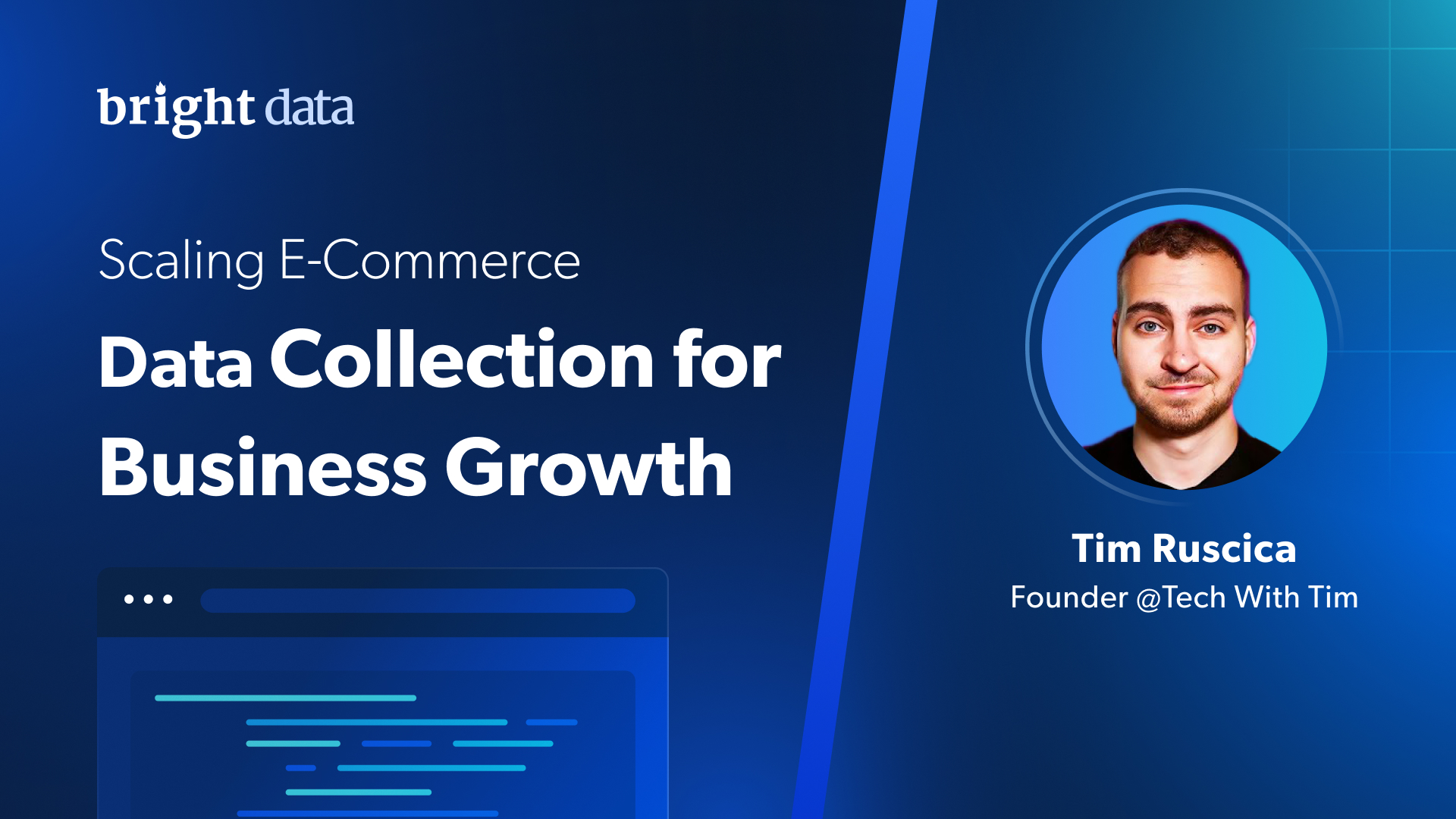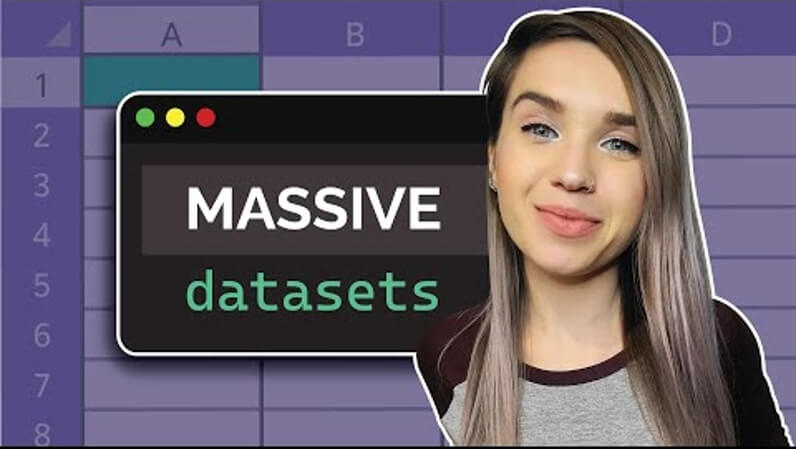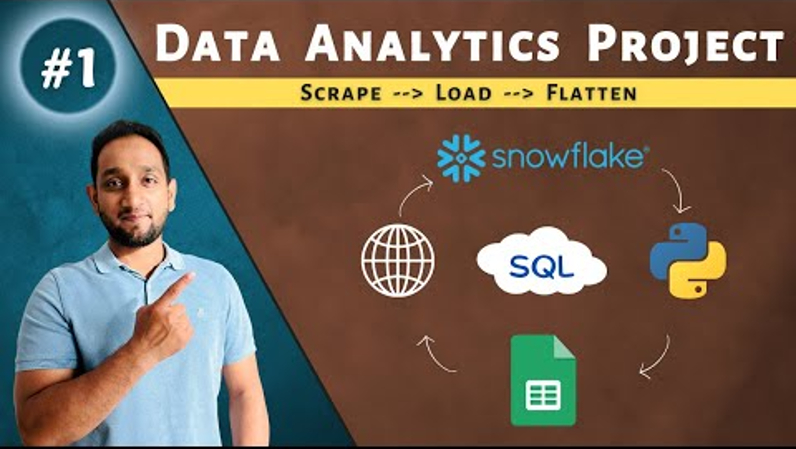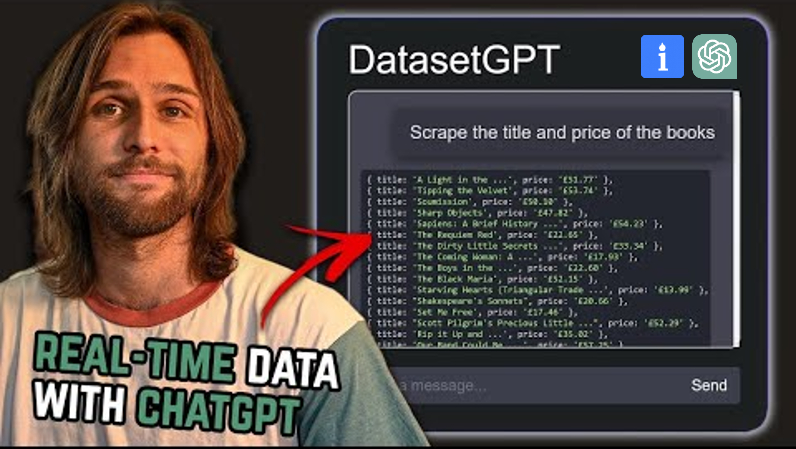In today’s digital age, data is the backbone of informed business decisions. Collecting e-commerce data efficiently and at scale can provide invaluable insights for your business.
My name is Tim Ruscica, a software developer and content creator. I have collaborated extensively with Bright Data on web scraping projects and am here to share insights from a developer’s perspective. This post will cover the complexities of scaling data operations, the tools and strategies to make the process more efficient, and best practices for building robust data infrastructure.
Key Challenges in Data Collection
Before diving into scaling, it’s important to understand the fundamental challenges of data collection:
- Navigating Data Collection Barriers: Publicly available data isn’t always easy to access. Challenges include CAPTCHA and IP bans, which can hinder data scraping efforts.
- Managing Infrastructure: Handling multiple proxies and IP addresses is crucial to avoid being banned and to scrape data from various regions.
- Ensuring Data Quality: Poor or outdated data can be more harmful than no data. Ensuring high-quality, up-to-date data is essential.
The Data Collection Process
1. Collection
The first step involves strategizing what data you need, in what format, and where to find it. Automation is key here. Writing scripts to scrape data ensures efficiency and scalability.
2. Storage
Once collected, data needs to be stored securely and in a scalable manner. While this topic warrants a separate discussion, the primary goal is to have a structured, organized, and secure storage solution.
3. Access
Data should be easily accessible, ideally through user-friendly dashboards. Bright Data’s tool, Bright Insights, is designed to make data access straightforward with built-in filters and insights.
Scaling Data Collection
Continuous Data Collection
Collecting data once is different from doing it continuously. For instance, monitoring prices and inventory on e-commerce sites like Amazon requires regular updates. Continuous data collection enables businesses to stay updated with market trends and competitor pricing.
Vertical and Horizontal Scaling
Simply adding more computing power or additional computers doesn’t necessarily solve the problem of scale. As demonstrated, trying to scrape multiple pages simultaneously from a single IP address leads to being detected as a bot and blocked.
Using Bright Data’s Scraping Browser
Bright Data’s scraping browser solves these issues. It bypasses CAPTCHA and IP blocks, enabling efficient data collection at scale. Here’s how it works:
- Minimal Code Changes: Connecting to the Bright Data browser involves minimal modifications to your existing scripts.
- Speed and Efficiency: Scraping multiple pages becomes significantly faster. For instance, scraping 30 pages takes just 44 seconds, and scaling to 250 pages takes only 95 seconds without encountering blocks.
Headless vs. Scraping Browsers
- Headless Browsers: These are efficient for tasks that don’t require a graphical user interface (GUI), allowing for faster data scraping with lower overhead.
- Scraping Browsers: For more complex tasks requiring interaction with web elements (e.g., filling out forms, clicking buttons), scraping browsers emulate human interactions, making them ideal for scraping interactive e-commerce sites like Airbnb or Amazon.
Leveraging Advanced Tools
Bright Data also offers the Web Scraper IDE, a comprehensive tool that combines all the necessary features for efficient data scraping. Here’s what it offers:
- Integrated Development Environment (IDE): Develop and debug scraping scripts directly in the browser.
- Crawler and Proxy Management: Automatically handles proxies and unblocking features, ensuring seamless data collection.
- Cloud Hosting: Host scrapers in the cloud, eliminating the need for maintaining your own infrastructure.
Practical Demo
To illustrate, let’s consider scraping data from Wayfair:
- Initial Setup: Using a simple script, attempt to scrape 30 pages. This process can take a significant amount of time and often results in CAPTCHA challenges and IP blocks.
- Scaling with Bright Data: By connecting to Bright Data’s scraping browser, the same task is completed in a fraction of the time without encountering any blocks.
Benefits of Using Bright Data
- No Need to Reinvent the Wheel: Utilize existing solutions rather than building complex infrastructure from scratch.
- Reduced Developer Resources: Allows even non-expert developers to efficiently collect web data.
- Focus on Core Business: Concentrate on e-commerce rather than software development.
- Transparent and Predictable Pricing: Avoid unexpected costs and lengthy development times.
- Full Flexibility: Provides your in-house development team with the tools they need to overcome scaling challenges.
Conclusion
Scaling e-commerce data collection is a complex but essential task for modern businesses. By leveraging Bright Data’s advanced tools and best practices, you can efficiently scale your data operations, ensuring you have the insights needed for business growth. Whether you’re collecting data for market analysis, competitor monitoring, or pricing strategies, these solutions will streamline your processes and enhance your business intelligence capabilities.
For more details and to see these tools in action, visit Bright Data’s official website and explore the variety of solutions designed to meet your data collection needs.













